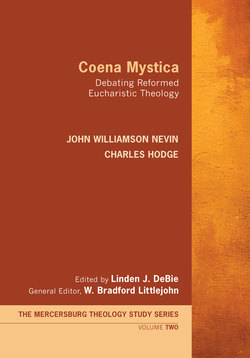Описание книги
Coena Mystica contains the never-before-reprinted text of John Williamson Nevin's response to Charles Hodge's devastating critiques of his 1846 magnum opus, The Mystical Presence. Initially appearing in twelve issues of the little-known Weekly Messenger of the German Reformed Church and almost entirely neglected by historians since, Nevin's response included the full text of Hodge's article, with his rejoinders interspersed every few pages. These articles, in addition to providing a lively and illuminating debate on the roots of Reformed eucharistic theology, take the disputants into such fields as the nature of the church, the development of doctrine, the person and work of Christ, and the merits of German idealism. The quality of the historical argument and theological acumen here displayed makes this exchange one of the landmark theological controversies of the nineteenth century, a gift to historians of the period, students of Reformed theology, and anyone seeking to better understand the contentious legacy of the Protestant Reformation. The present critical edition carefully preserves the original text, while providing extensive introductions, annotations, and bibliography to orient the modern reader and facilitate further scholarship.
The Mercersburg Theology Study Series is an attempt to make available for the first time, in attractive, readable, and scholarly modern editions, the key writings of the nineteenth-century movement known as the Mercersburg Theology. An ambitious multi-year project, this aims to make an important contribution to the scholarly community and to the broader reading public, who can at last be properly introduced to this unique blend of American and European, Reformed and Catholic theology.
The Mercersburg Theology Study Series is an attempt to make available for the first time, in attractive, readable, and scholarly modern editions, the key writings of the nineteenth-century movement known as the Mercersburg Theology. An ambitious multi-year project, this aims to make an important contribution to the scholarly community and to the broader reading public, who can at last be properly introduced to this unique blend of American and European, Reformed and Catholic theology.
